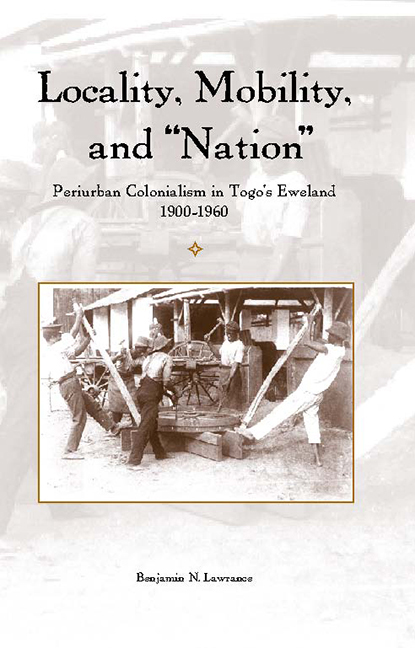Book contents
- Frontmatter
- Dedication
- Contents
- List of Illustrations
- Preface
- Notes on Orthography
- Map
- Introduction: Conceptualizing Periurban Colonialism in Sub-Saharan Africa
- 1 Mobility, Locality, and Ewe Identity in Periurban Eweland
- 2 Intervention and Dissent: Manufacturing the Model Periurban Chief
- 3 Crisis in an Ewe “Capital”: The Periurban Zone Descends on t he City
- 4 Vodou and Resistance: Politico-Religious Crises in t he Periurban Landscape
- 5 The German Togo-Bund and the Periurban Manifestations of “Nation”
- 6 From Eweland to la République Togolaise: Le Guide du Togo and the Periurban Circulation of Knowledge
- Epilogue
- Notes
- Bibliography
- Index
Introduction: Conceptualizing Periurban Colonialism in Sub-Saharan Africa
Published online by Cambridge University Press: 11 May 2017
- Frontmatter
- Dedication
- Contents
- List of Illustrations
- Preface
- Notes on Orthography
- Map
- Introduction: Conceptualizing Periurban Colonialism in Sub-Saharan Africa
- 1 Mobility, Locality, and Ewe Identity in Periurban Eweland
- 2 Intervention and Dissent: Manufacturing the Model Periurban Chief
- 3 Crisis in an Ewe “Capital”: The Periurban Zone Descends on t he City
- 4 Vodou and Resistance: Politico-Religious Crises in t he Periurban Landscape
- 5 The German Togo-Bund and the Periurban Manifestations of “Nation”
- 6 From Eweland to la République Togolaise: Le Guide du Togo and the Periurban Circulation of Knowledge
- Epilogue
- Notes
- Bibliography
- Index
Summary
On December 4, 1947, Sylvanus Olympio stepped off a Pan American clipper at New York's La Guardia Airport. Olympio's quest was to press the case for the unification under a single government of “his people, the Ewe tribe” before the United Nations Trusteeship Council. He was not there as a representative of the Africans living in French-administered Togo, but as an envoy from the All Ewe Conference (AEC), an umbrella group of ethnic nationalist organizations spearheading the independence drive of “his people.” UN officials were apprehensive. In the words of one observer, “we had heard that there was a petitioner coming from Africa and didn't know quite what to expect. None of the delegates knew much about Africa, and I sincerely believe many of them expected someone to come rushing into the Council in a leopard skin and accompanied by a rumble of drums.” Although Olympio's unexpectedly Westernized appearance and eloquent delivery drew considerable comment, what really captured media attention was the clarity and vision of his sustained attack on British and French colonial practices.
From today's perspective what is striking about Olympio's 1947 speech is how fleeting was his commitment to one definition of nation. Over the course of the 1950s, Olympio moved swiftly from asserting Ewe ethnic nationalism to an embrace of Togolese territorial nationalism that deemphasized ethnic identities and emphasized territorial integrity. He steered French Togoland to independence in 1960. But as president of the multiethnic Togolese nation he supervised a very different political regime from that which he had championed so passionately in 1947. Togo was a multiethnic state led by Ewe men, but it was no Ewe homeland (see map I.1). Olympio was less a visionary and more an opportunist, and he was raised in a culture of political opportunism. We will reexamine the social, political, and economic antecedents to the Ewe unification movement in order to account for the disjuncture between the roles played by ethnic and territorial nationalism in the African independence struggle.
- Type
- Chapter
- Information
- Locality, Mobility, and "Nation"Periurban Colonialism in Togo's Eweland, 1900–1960, pp. 1 - 20Publisher: Boydell & BrewerPrint publication year: 2007

